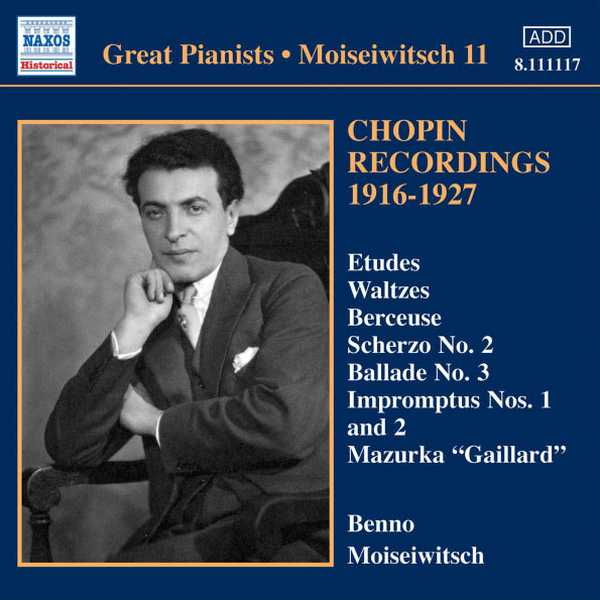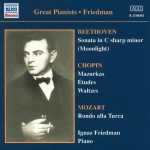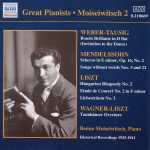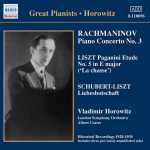
Composer: Frédéric François Chopin, Ferencz Liszt
Performer: Benno Moiseiwitsch
Orchestra:
Conductor:
Format: FLAC (tracks)
Label: Naxos
Catalogue: 8111117
Release: 2007
Size: 217 MB
Recovery: +3%
Scan: yes
01. Chopin: Berceuse in D flat major, Op. 57
02. Chopin: Prelude No. 20 in C minor, Op. 28, No. 20
03. Chopin: Waltz No. 6 in D flat major, Op. 64 No. 1 ‘Minute Waltz’
Chopin: Waltz No. 11 in G flat major, Op. 70
04. No. 1 (take 1)
05. No. 1 (take 2)
Chopin: Impromptu No. 2 in F sharp major, Op. 36
06. Impromptu No. 2 in F sharp major, Op. 36 (take 6)
07. Impromptu No. 2 in F sharp major, Op. 36 (take 7)
08. Chopin: Nocturne No. 19 in E minor, Op. 72 No. 1
09. Chopin: Mazurka No. 51 in A minor ‘Émile Gaillard’
Liszt: Chants Polonais after Chopin, S480
10. No. 5. Meine Freuden (My Joys)
11. Chopin: Scherzo No. 2 in B flat minor, Op. 31
12. Chopin: Impromptu No. 1 in A flat major, Op. 29
13. Chopin: Waltz No. 14 in E minor, Op. post., KKIVa:15, B 56
Chopin: Études, Op. 10
14. Etude No. 11 in E flat major, Op. 10, No. 11
15. Etude No. 4 in C sharp minor, Op. 10, No. 4
Chopin: Études, Op. 25
16. Etude No. 15 in F major, Op. 25, No. 3
Chopin: Études, Op. 10
17. Etude No. 10 in A flat major, Op. 10, No. 10
18. Chopin: Polonaise No. 9 in B flat major, Op. 71 No. 2
19. Chopin: Ballade No. 3 in A flat major, Op. 47
Ward Marston has done his best with Vol 11 of Naxos’s invaluable Moiseiwitsch series where the pianist’s legendary magic somehow surfaces through recordings dating from 1916-22 and 1925-27. Moiseiwitsch’s Chopin remains indelibly his own, and if his frequent desynchronisation of the hands, expressive dalliance, the odd clinker and a naughty, twinkly delight in tampering with the text are old-fashioned, they are often attributes rather than failings. True, there were days when, overstretched by an unnerving schedule, Moiseiwitsch could sound diffident and workaday, but at his finest he could lighten even the most serious gesture or idea with a nonchalant wit and sparkle. The little B flat Polonaise (a Moiseiwitsch speciality) is spun off with all his charm and virtuosity, and his selection of four Etudes crosses the Rubicon from pragmatism to poetry with a wealth of colour, grace and nuance unknown to all but the finest pianists. The Second Scherzo may bristle with confusions and approximations but it is never less than brilliantly alive and, most generously, there are two performances of both the G flat Waltz and F sharp Impromptu for comparison and enlightenment.



